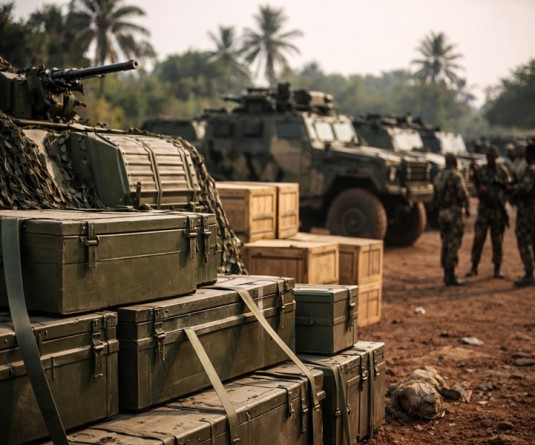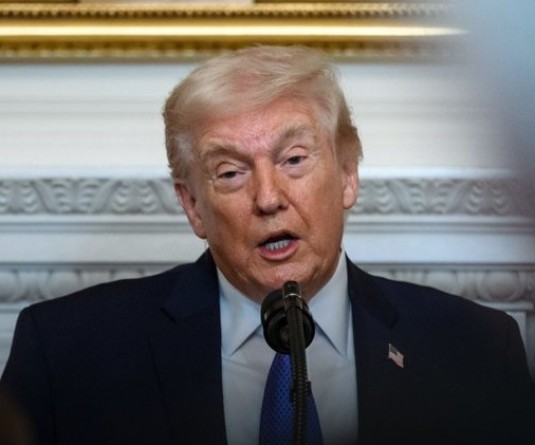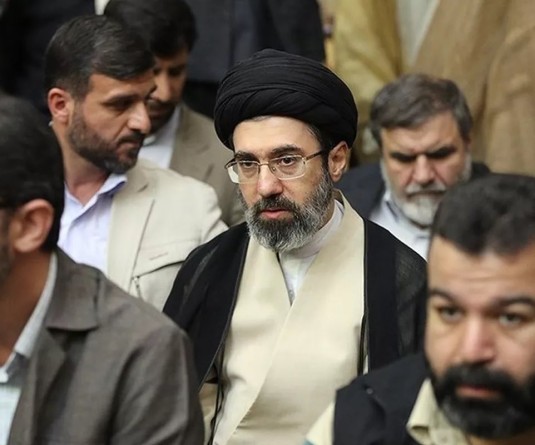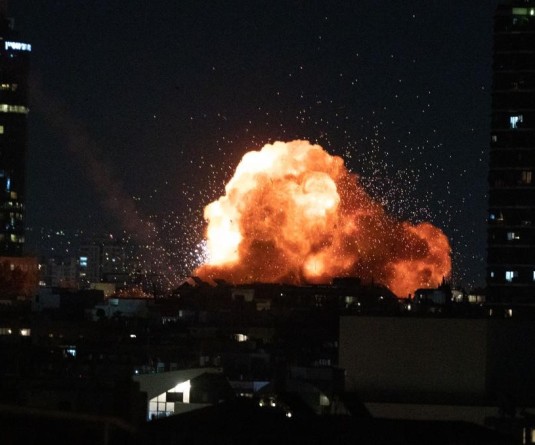
Thousands of Egyptians wave Egyptians flags and posters supporting President Mubarak during a march in Cairo, Egypt on Wednesday, February 2. (AP Photo)
CAIRO, February 2 (AP): The Egyptian military called Wednesday for an end to more than a week of demonstrations against President Hosni Mubarak, throwing its support behind his embattled regime hours after he defiantly rejected demands to step down immediately and said he would serve out his term in office. The declaration was a clear shift in the stand of the army, which gave a tacit endorsement to the movement on Monday by saying it would not use force against protesters, and that they had legitimate demands.
Several thousand pro-Mubarak demonstrators held marches and protests around Cairo, raising the danger of clashes with anti-government protesters. The Mediterranean city of Alexandria saw fighting erupt between several hundred protesters and government supporters early Wednesday after Mubarak spoke, Al-Jazeera television footage showed.
Protesters formed a human chain at the northern end of Cairo's main square between the pro-Mubarak protesters and several thousand people calling for the president's ouster. Traffic barriers and an army personnel carrier also stood between the two sides in the square, the epicenter of the protests against Mubarak.
The emboldened protesters brought more than 250,000 people into Cairo's main square Tuesday to demand Mubarak leave within days. The president responded before midnight with a statement pledging to serve seven more months in office and "die on Egyptian soil."
Representatives of his National Democratic Party immediately began making public statements trying to project the image of the regime as Egypt's sole path back to stability and security after the disruption of normal life caused by eight days of protests, and a wave of looting and arson that gripped the country over the weekend after the government pulled police from the street. The army's message to the demonstrators had a more conciliatory tone, appealing to young protesters to stand down "out of love for Egypt."
"You have started coming out to express your demands and you are the ones capable of returning normal life to Egypt," military spokesman Ismail Etman said in an address on state television. "Your message has arrived, your demands have become known."
Immediately after his statement, state television ran a scrolling message reading: "The armed forces call on the protesters to go home for the sake of bringing back stability." Internet service also began returning to Egypt after days of an unprecedented cutoff by the government, and state TV said authorities were easing a nighttime curfew, which now runs from 5 p.m. to 7 a.m. instead of 3 p.m. to 8 a.m.
Several thousand people outside Mustafa Mahmoud Mosque in the upper-class neighborhood of Mohandiseen waved Egyptian flags and carried a large printed banner with Mubarak's face. Many passing cars honked in apparent support. Police officers surrounded the area and directed traffic. Some pro-Mubarak protesters expressed fears of continuing shortages of food and other necessities if protesters in Tahrir Square didn't end demonstrations.
"I want the people in Tahrir Square to understand that Mubarak gave his word that he will give them the country to them through elections, peacefully, now they have no reason for demonstrations," said Ali Mahmoud, 52, who identified himself as middle-class worker from Menoufia, a Nile Delta province north of Cairo. The presence of significant numbers of pro- and anti-Mubarak forces on the streets Ahmed Abdel Hamid, representing The Revolutionary Committee, one of several youth groups that organized the protests, said that the regime was going all out to pressure people to stop protesting.
"Starting with the emotional speech of Mubarak, to the closure of banks, the shortage of food and commodities and deployment of thugs to intimidate people, these are all means to put pressure on the people"
The movement against Mubarak is fueled by deep frustration with an autocratic regime blamed for ignoring the needs of the poor and allowing corruption and official abuse to run rampant. After years of tight state control, protesters emboldened by unrest in Tunisia took to the streets on Jan. 25 and mounted a once-unimaginable series of protests across this nation of 80 million.
In his 10-minute address, Mubarak appeared somber but spoke firmly and without an air of defeat. He insisted that even if the protests demanding his ouster had never broken out, he would not have sought a sixth term in September.
He said he would serve out the rest of his term working "to accomplish the necessary steps for the peaceful transfer of power." He said he will carry out amendments to rules on presidential elections.
Mubarak, a former air force commander, vowed not to flee the country.
"This is my dear homeland," he said. "I have lived in it, I fought for it and defended its soil, sovereignty and interests. On its soil I will die. History will judge me and all of us."
The step came after heavy pressure from his top ally, the United States. Soon after Mubarak's address, President Barack Obama said at the White House that he had spoken with Mubarak and "he recognizes that the status quo is not sustainable and a change must take place." Obama said he told Mubarak that an orderly transition must be meaningful and peaceful, must begin now and must include opposition parties.
Earlier, a visiting Obama envoy - former ambassador to Egypt Frank Wisner, who is a friend of the Egyptian president - met with Mubarak and made clear to him that it is the U.S. "view that his tenure as president is coming to a close," according to an administration official, who spoke on condition of anonymity because of the delicacy of the ongoing diplomacy.
The United States has been struggling to find a way to ease Mubarak out of office while maintaining stability in Egypt, a key ally in the Mideast that has a 30-year-old peace treaty with Israel and has been a bulwark against Islamic militancy.
Mubarak would be the second Arab leader pushed from office by a popular uprising in the history of the modern Middle East, following the ouster last month of the president of Tunisia - another North African nation.
On Wednesday morning in the capital, long lines formed at gas stations and bakeries. Fresh vegetables have all but vanished from Cairo, with farm producers from surrounding areas unable to ferry their goods to the city of 18 million people.
Some cars in Cairo had small papers stuck on their windscreen declaring 'Yes to Mubarak."
Several thousand pro-Mubarak demonstrators held marches and protests around Cairo, raising the danger of clashes with anti-government protesters. The Mediterranean city of Alexandria saw fighting erupt between several hundred protesters and government supporters early Wednesday after Mubarak spoke, Al-Jazeera television footage showed.
Protesters formed a human chain at the northern end of Cairo's main square between the pro-Mubarak protesters and several thousand people calling for the president's ouster. Traffic barriers and an army personnel carrier also stood between the two sides in the square, the epicenter of the protests against Mubarak.
The emboldened protesters brought more than 250,000 people into Cairo's main square Tuesday to demand Mubarak leave within days. The president responded before midnight with a statement pledging to serve seven more months in office and "die on Egyptian soil."
Representatives of his National Democratic Party immediately began making public statements trying to project the image of the regime as Egypt's sole path back to stability and security after the disruption of normal life caused by eight days of protests, and a wave of looting and arson that gripped the country over the weekend after the government pulled police from the street. The army's message to the demonstrators had a more conciliatory tone, appealing to young protesters to stand down "out of love for Egypt."
"You have started coming out to express your demands and you are the ones capable of returning normal life to Egypt," military spokesman Ismail Etman said in an address on state television. "Your message has arrived, your demands have become known."
Immediately after his statement, state television ran a scrolling message reading: "The armed forces call on the protesters to go home for the sake of bringing back stability." Internet service also began returning to Egypt after days of an unprecedented cutoff by the government, and state TV said authorities were easing a nighttime curfew, which now runs from 5 p.m. to 7 a.m. instead of 3 p.m. to 8 a.m.
Several thousand people outside Mustafa Mahmoud Mosque in the upper-class neighborhood of Mohandiseen waved Egyptian flags and carried a large printed banner with Mubarak's face. Many passing cars honked in apparent support. Police officers surrounded the area and directed traffic. Some pro-Mubarak protesters expressed fears of continuing shortages of food and other necessities if protesters in Tahrir Square didn't end demonstrations.
"I want the people in Tahrir Square to understand that Mubarak gave his word that he will give them the country to them through elections, peacefully, now they have no reason for demonstrations," said Ali Mahmoud, 52, who identified himself as middle-class worker from Menoufia, a Nile Delta province north of Cairo. The presence of significant numbers of pro- and anti-Mubarak forces on the streets Ahmed Abdel Hamid, representing The Revolutionary Committee, one of several youth groups that organized the protests, said that the regime was going all out to pressure people to stop protesting.
"Starting with the emotional speech of Mubarak, to the closure of banks, the shortage of food and commodities and deployment of thugs to intimidate people, these are all means to put pressure on the people"
The movement against Mubarak is fueled by deep frustration with an autocratic regime blamed for ignoring the needs of the poor and allowing corruption and official abuse to run rampant. After years of tight state control, protesters emboldened by unrest in Tunisia took to the streets on Jan. 25 and mounted a once-unimaginable series of protests across this nation of 80 million.
In his 10-minute address, Mubarak appeared somber but spoke firmly and without an air of defeat. He insisted that even if the protests demanding his ouster had never broken out, he would not have sought a sixth term in September.
He said he would serve out the rest of his term working "to accomplish the necessary steps for the peaceful transfer of power." He said he will carry out amendments to rules on presidential elections.
Mubarak, a former air force commander, vowed not to flee the country.
"This is my dear homeland," he said. "I have lived in it, I fought for it and defended its soil, sovereignty and interests. On its soil I will die. History will judge me and all of us."
The step came after heavy pressure from his top ally, the United States. Soon after Mubarak's address, President Barack Obama said at the White House that he had spoken with Mubarak and "he recognizes that the status quo is not sustainable and a change must take place." Obama said he told Mubarak that an orderly transition must be meaningful and peaceful, must begin now and must include opposition parties.
Earlier, a visiting Obama envoy - former ambassador to Egypt Frank Wisner, who is a friend of the Egyptian president - met with Mubarak and made clear to him that it is the U.S. "view that his tenure as president is coming to a close," according to an administration official, who spoke on condition of anonymity because of the delicacy of the ongoing diplomacy.
The United States has been struggling to find a way to ease Mubarak out of office while maintaining stability in Egypt, a key ally in the Mideast that has a 30-year-old peace treaty with Israel and has been a bulwark against Islamic militancy.
Mubarak would be the second Arab leader pushed from office by a popular uprising in the history of the modern Middle East, following the ouster last month of the president of Tunisia - another North African nation.
On Wednesday morning in the capital, long lines formed at gas stations and bakeries. Fresh vegetables have all but vanished from Cairo, with farm producers from surrounding areas unable to ferry their goods to the city of 18 million people.
Some cars in Cairo had small papers stuck on their windscreen declaring 'Yes to Mubarak."
Obama for immediate beginning of transition
WASHINGTON, February 2 (PTI): US President Barack Obama called for immediate beginning of an orderly transition in Egypt, which has witnessed massive protests seeking the ouster of President Hosni Mubarak. "What is clear, and what I indicated tonight to President Mubarak, is my belief that an orderly transition must be meaningful, it must be peaceful, and it must begin now," Obama said in his speech at the White House after he spoke for 30 minutes with Mubarak, who ruling Egypt for three decades.
The process of orderly transition must include a broad spectrum of Egyptian voices in opposition parties, he said. "It should lead to elections that are free and fair. And it should result in a government that's not only grounded in democratic principles, but is also responsive to the aspirations of the Egyptian people," Obama asserted. Referring to his conversation with Mubarak, the second one in less than a week, Obama said the Egyptian leader understood the status quo is not sustainable and that a change must take place. "Indeed, all of us who are privileged to serve in positions of political power do so at the will of our people. Through thousands of years, Egypt has known many moments of transformation. The voices of the Egyptian people tell us that this is one of those moments, this is one of those times."
US President said his administration has been in close contact with its Egyptian counterpart and a broad range of the Egyptian people, as well as others across the region and across the globe. "And throughout this period, we've stood for a set of core principles," he said.
Obama also praised Egyptian army for not using force against agitators and allowing peaceful protests. "First, we oppose violence. And I want to commend the Egyptian military for the professionalism and patriotism that it has shown thus far in allowing peaceful protests while protecting the Egyptian people. "We've seen tanks covered with banners, and soldiers and protesters embracing in the streets. And going forward, I urge the military to continue its efforts to help ensure that this time of change is peaceful," he said.
WASHINGTON, February 2 (PTI): US President Barack Obama called for immediate beginning of an orderly transition in Egypt, which has witnessed massive protests seeking the ouster of President Hosni Mubarak. "What is clear, and what I indicated tonight to President Mubarak, is my belief that an orderly transition must be meaningful, it must be peaceful, and it must begin now," Obama said in his speech at the White House after he spoke for 30 minutes with Mubarak, who ruling Egypt for three decades.
The process of orderly transition must include a broad spectrum of Egyptian voices in opposition parties, he said. "It should lead to elections that are free and fair. And it should result in a government that's not only grounded in democratic principles, but is also responsive to the aspirations of the Egyptian people," Obama asserted. Referring to his conversation with Mubarak, the second one in less than a week, Obama said the Egyptian leader understood the status quo is not sustainable and that a change must take place. "Indeed, all of us who are privileged to serve in positions of political power do so at the will of our people. Through thousands of years, Egypt has known many moments of transformation. The voices of the Egyptian people tell us that this is one of those moments, this is one of those times."
US President said his administration has been in close contact with its Egyptian counterpart and a broad range of the Egyptian people, as well as others across the region and across the globe. "And throughout this period, we've stood for a set of core principles," he said.
Obama also praised Egyptian army for not using force against agitators and allowing peaceful protests. "First, we oppose violence. And I want to commend the Egyptian military for the professionalism and patriotism that it has shown thus far in allowing peaceful protests while protecting the Egyptian people. "We've seen tanks covered with banners, and soldiers and protesters embracing in the streets. And going forward, I urge the military to continue its efforts to help ensure that this time of change is peaceful," he said.






